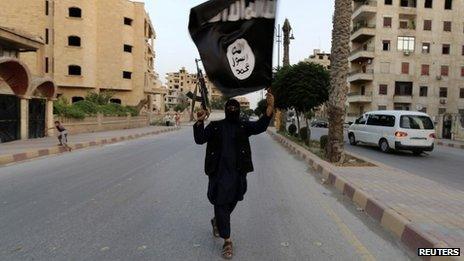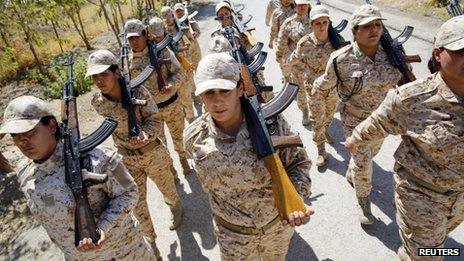Jeremy Bowen: Who will fight Islamic State?
- Published

In military terms, IS is far from invincible - but it carries a message that has a real resonance among some people
There are some big holes in President Barack Obama's plans to fight Islamic State (IS).
The biggest is among the most crucial: If American troops are not going to take the fight to IS on the ground, who will?
The problem is less acute in Iraq. The Kurdish peshmerga are keen to fight, and should be effective as long as they get the training and heavy weapons they need.
And Shia militias there are also fighting IS and are backed by Iran, trained by Iranians or Lebanese fighters from Hezbollah, and have a bloodthirsty reputation - although any excesses could have the effect of making Arab Sunnis in Iraq turn to IS, or other militias, for protection.
But muddled thinking and analysis flaw the US approach to Syria. It rests on the hope that there will be "moderate" opposition fighters who can be armed and trained to attack IS under a protective blanket of US air power.

The Kurdish peshmerga have proved an effective fighting force in the past
For more than three years, Western governments have attempted to create a moderate Syrian opposition that it can support with words and perhaps even with weapons. Very little has been achieved that has had an effect within Syria itself.
Now an idea that had seemed to have been abandoned, of building up a moderate force, has been dusted off. The Pentagon has its doubts about the plans announced by President Obama, judging by the remarks in congressional testimony the other day by America's most senior military office, General Martin Dempsey, the chairman of the US Joint Chiefs of Staff.
Not long after the president said emphatically that there would be no combat mission for US ground troops, General Dempsey said that there might have to be one. He wanted to keep his options open, in case of complicated military operations, or more seriously if the mission was failing.
Alliances with jihadists
America's problem is that the politics of the war in Syria are tangled. Finding allies it can trust will be difficult.
Most Syrian armed opposition groups fear and hate IS. Some have been fighting them this year. But their wars against IS have helped to blur some of the distinctions between the groups. Something similar has happened because of the need to pool resources to take on the Syrian regime.
The BBC's Jeremy Bowen: "About 300 metres separate the front lines"
I spent a day with a Syrian army unit about 20 minutes drive south of Damascus. On the other side of the front line, about 300m (984ft) away, was a joint force of armed rebels. It included al-Nusra, Syria's al-Qaeda affiliate; the Islamic Front; and the supposed moderates of the Free Syria Army (FSA).
I have met many FSA fighters and they do have moderate views, certainly in comparison with jihadist groups. But the fighters are often religious and see no problem with building up alliances with the jihadists against a common enemy. Fighters also move from one group to another.
The trouble with that from America's perspective is that it does not want its weapons, or men it has trained, finding their way into al-Qaeda and its like. But among the Syrian rebels, alliances are fluid and change according to the state of the war.
Making a force of the kind the Americans want - so tight and so strong that its weapons never get to jihadists - might be impossible. It will be just as hard to train it to beat IS.
Then there is the effect of US bombing, when and if it happens in Syria. It has been bad enough for Syrians who have been in places that have been hit by the Syrian air force. Its barrel bombs are even more terrifying than conventional air strikes.
Now they face the prospect of American raids too. In all the places the Americans have bombed, innocent people get killed as well as the fighters or leaders who have been targeted. That tends to increase support for the groups that are being attacked.

Note: figures do not take into account those who may have left the region or died during fighting
In purely military terms, IS is far from invincible. But it carries a message that has a real resonance among some people, mainly young men of fighting age, who are alienated and excluded from the societies in which they grew up.
Its threat, to Sunni Arab royal families more than Western democracies, lies in that message rather than military power.
The air forces of Saudi Arabia and the United Arab Emirates, bought at vast expense from the British and the Americans, are capable of knocking out every tank Islamic State can capture or buy. But it is highly unlikely that they would do that, and not just because the Americans are there to do it for them.
They fear the effect that killing Sunnis, not just jihadists, might have on some of their own young men, some of whom have already joined IS. It is a fair bet that they are already gripped by the power of the videos IS puts on the web. They horrify many but amplify the message of jihad, exciting and motivating those who need brutal answers to their problems.
IS is not trying to get mass appeal. It wants disciplined, dedicated cadres who seek death. It does not need many people to cause trouble outside the borders of the parts of Syria and Iraq it has declared its caliphate.
That is why IS is being treated with great caution by America's Arab allies - and why this could be the beginning of another long, hard, bloody episode in the Middle East.